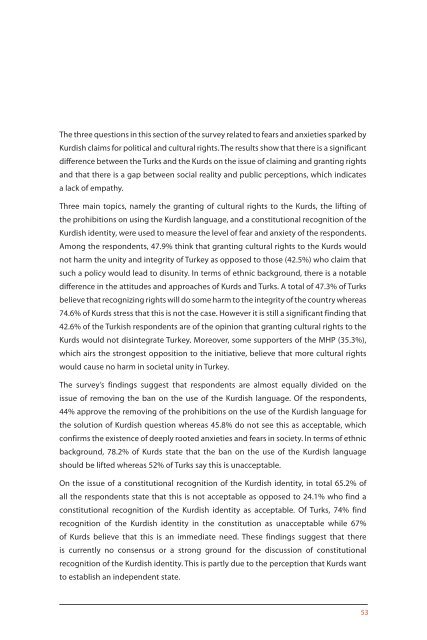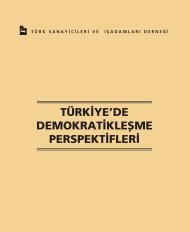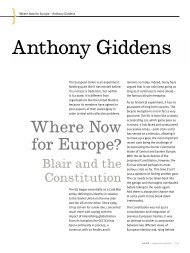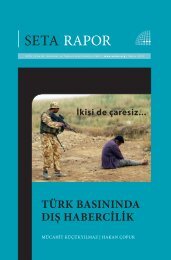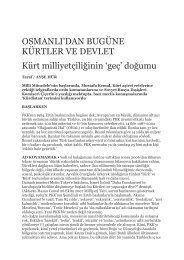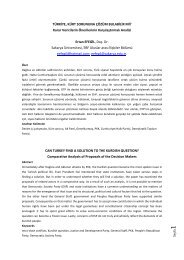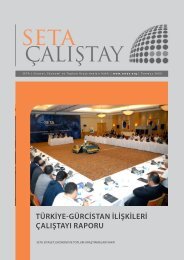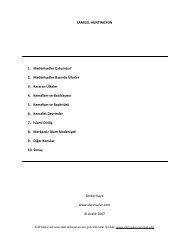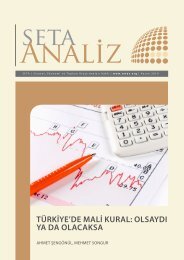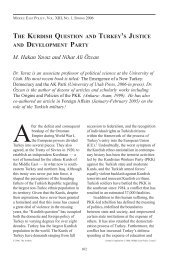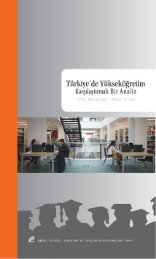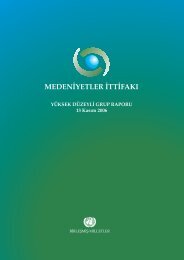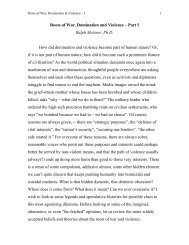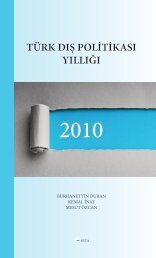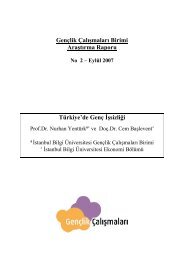public perception of the kurdish question in turkey - the SETA ...
public perception of the kurdish question in turkey - the SETA ...
public perception of the kurdish question in turkey - the SETA ...
You also want an ePaper? Increase the reach of your titles
YUMPU automatically turns print PDFs into web optimized ePapers that Google loves.
P u b l i c P e r c e p t i o n o f t h e K u r d i s h Q u e s t i o n i n T u r k e y<br />
The three <strong>question</strong>s <strong>in</strong> this section <strong>of</strong> <strong>the</strong> survey related to fears and anxieties sparked by<br />
Kurdish claims for political and cultural rights. The results show that <strong>the</strong>re is a significant<br />
difference between <strong>the</strong> Turks and <strong>the</strong> Kurds on <strong>the</strong> issue <strong>of</strong> claim<strong>in</strong>g and grant<strong>in</strong>g rights<br />
and that <strong>the</strong>re is a gap between social reality and <strong>public</strong> <strong>perception</strong>s, which <strong>in</strong>dicates<br />
a lack <strong>of</strong> empathy.<br />
Three ma<strong>in</strong> topics, namely <strong>the</strong> grant<strong>in</strong>g <strong>of</strong> cultural rights to <strong>the</strong> Kurds, <strong>the</strong> lift<strong>in</strong>g <strong>of</strong><br />
<strong>the</strong> prohibitions on us<strong>in</strong>g <strong>the</strong> Kurdish language, and a constitutional recognition <strong>of</strong> <strong>the</strong><br />
Kurdish identity, were used to measure <strong>the</strong> level <strong>of</strong> fear and anxiety <strong>of</strong> <strong>the</strong> respondents.<br />
Among <strong>the</strong> respondents, 47.9% th<strong>in</strong>k that grant<strong>in</strong>g cultural rights to <strong>the</strong> Kurds would<br />
not harm <strong>the</strong> unity and <strong>in</strong>tegrity <strong>of</strong> Turkey as opposed to those (42.5%) who claim that<br />
such a policy would lead to disunity. In terms <strong>of</strong> ethnic background, <strong>the</strong>re is a notable<br />
difference <strong>in</strong> <strong>the</strong> attitudes and approaches <strong>of</strong> Kurds and Turks. A total <strong>of</strong> 47.3% <strong>of</strong> Turks<br />
believe that recogniz<strong>in</strong>g rights will do some harm to <strong>the</strong> <strong>in</strong>tegrity <strong>of</strong> <strong>the</strong> country whereas<br />
74.6% <strong>of</strong> Kurds stress that this is not <strong>the</strong> case. However it is still a significant f<strong>in</strong>d<strong>in</strong>g that<br />
42.6% <strong>of</strong> <strong>the</strong> Turkish respondents are <strong>of</strong> <strong>the</strong> op<strong>in</strong>ion that grant<strong>in</strong>g cultural rights to <strong>the</strong><br />
Kurds would not dis<strong>in</strong>tegrate Turkey. Moreover, some supporters <strong>of</strong> <strong>the</strong> MHP (35.3%),<br />
which airs <strong>the</strong> strongest opposition to <strong>the</strong> <strong>in</strong>itiative, believe that more cultural rights<br />
would cause no harm <strong>in</strong> societal unity <strong>in</strong> Turkey.<br />
The survey’s f<strong>in</strong>d<strong>in</strong>gs suggest that respondents are almost equally divided on <strong>the</strong><br />
issue <strong>of</strong> remov<strong>in</strong>g <strong>the</strong> ban on <strong>the</strong> use <strong>of</strong> <strong>the</strong> Kurdish language. Of <strong>the</strong> respondents,<br />
44% approve <strong>the</strong> remov<strong>in</strong>g <strong>of</strong> <strong>the</strong> prohibitions on <strong>the</strong> use <strong>of</strong> <strong>the</strong> Kurdish language for<br />
<strong>the</strong> solution <strong>of</strong> Kurdish <strong>question</strong> whereas 45.8% do not see this as acceptable, which<br />
confirms <strong>the</strong> existence <strong>of</strong> deeply rooted anxieties and fears <strong>in</strong> society. In terms <strong>of</strong> ethnic<br />
background, 78.2% <strong>of</strong> Kurds state that <strong>the</strong> ban on <strong>the</strong> use <strong>of</strong> <strong>the</strong> Kurdish language<br />
should be lifted whereas 52% <strong>of</strong> Turks say this is unacceptable.<br />
On <strong>the</strong> issue <strong>of</strong> a constitutional recognition <strong>of</strong> <strong>the</strong> Kurdish identity, <strong>in</strong> total 65.2% <strong>of</strong><br />
all <strong>the</strong> respondents state that this is not acceptable as opposed to 24.1% who f<strong>in</strong>d a<br />
constitutional recognition <strong>of</strong> <strong>the</strong> Kurdish identity as acceptable. Of Turks, 74% f<strong>in</strong>d<br />
recognition <strong>of</strong> <strong>the</strong> Kurdish identity <strong>in</strong> <strong>the</strong> constitution as unacceptable while 67%<br />
<strong>of</strong> Kurds believe that this is an immediate need. These f<strong>in</strong>d<strong>in</strong>gs suggest that <strong>the</strong>re<br />
is currently no consensus or a strong ground for <strong>the</strong> discussion <strong>of</strong> constitutional<br />
recognition <strong>of</strong> <strong>the</strong> Kurdish identity. This is partly due to <strong>the</strong> <strong>perception</strong> that Kurds want<br />
to establish an <strong>in</strong>dependent state.<br />
53


